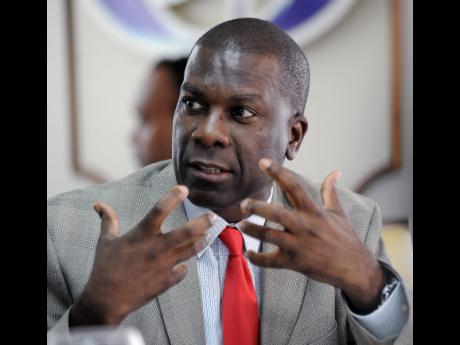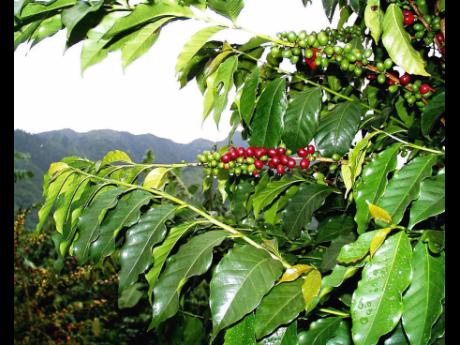Coffee rejection - Dealers fail to secure pricing deals in Japan
Local coffee exporters returned from Japan this month without any indication of pricing or deals from the large trading importers, which puts the US$25 million industry at a near standstill at least until Christmas.
At the same time, the sector is faced with increased competition with cheaper exotic coffees at a fraction of the cost.
"The truth is that the industry is in a crisis, but we can work through this overtime," said Norman Grant, chairman of the Jamaica Coffee Exporters Association, JCEA, the umbrella group for coffee processors, the largest of which includes Coffee Traders Limited and Mavis Bank Coffee Factory.
The Japanese importers want to watch sales during the Christmas season before they sign contracts for this crop, according to dealers.
It makes the "third consecutive year" without securing firm interest or pricing from these large importers of green beans, said Grant, who is also managing director for Mavis Bank.
Grant said that the emphasis should be on supporting farmers during this time while exporters seek to expand into new markets and fortify existing markets. Farmers are now receiving on average $4,500 for a box of coffee, but are paid as low as $3,000 a box.
Farmers have complained that the latter price is unsustainable. Some experts say that the cost of production on a farm usually is above $4,000.
The prices started dropping about two years ago. At the time, farmers started seeing a reduced price offered for a box of coffee. Down from a peak of $12,000 a box ($10,500 on average) to on average $5,000 a box in the 2017/18 crop year.
That was the context of the annual meeting between the JCEA and the Association of Japan Importers Of Jamaican Coffee (AJIJC) on September 27. That meeting reportedly discussed the demand for the product, the current position of the JBM coffee market in Japan, along with marketing promotion. The Japanese still have high levels of inventory which need to be sold somewhat, prior to making orders.
"What the Japanese shared at the meeting is the when they bought the coffees at high prices they did not sell it off, so they had high inventory," said Grant. "So the reduced prices will give them an opportunity to lower the weighted average prices and engage in a promotion of the product that could stimulate sales and increase demand in the long run."
Grant indicated that orders will depend on how "Christmas sales go" for Jamaica Blue Mountain Coffee, JBM.
Globally, coffee prices are at a two-year low but usually JBM, which is a premium coffee would be immune to global fluctuations. JBM green beans now sell for US$26 per kilogram.
Over the years however a number of coffee growing countries have been selling premium coffees that are cheaper with alluring exotic and sensory taste tones. These coffees usually sell for half to three-quarters the price of JBM.
Starbucks the world's largest coffee chain describes the JBM it sells as "floral aromas with cocoa and citrus flavours". That's the full JBM description. Contrastingly, it describes cheaper premium coffees with longer exotic descriptions such as Bolivian coffee as "smooth and balanced banana and red apple highlights with a brown-sugar finish"; St Helena coffee as "floral aromas with lemon accents and a caramelly sweetness"; coffee from the DR Congo as "lovely scents of wild berry with lemon and black cherry flavour"; Colombia Pedregal as "flavours reminiscent of pear and red apple with a panela sweetness"; and Ethiopian Bitta as "perfumed jasmine aromas with ginger spice and orange peel accents".
Grant admitted in part that times are changing; and that younger drinkers are choosing coffees from varied origins. He stressed however that JBM's heritage and quality keeps it 'on top'.
And he wants the Jamaican government to spend funds to promote the brand via agencies such as Jampro and Jamaica Tourist Board to keep it there.
Grant added that as part of promotional efforts to sell more coffee, exporters and importers will host a Jamaica Blue Mountain Day in January, both in Japan and Jamaica. It will mark the 50th Anniversary of the largest shipment of JBM back in the 1950s - that of three barrels by Keble Munn of the Mavis Bank Coffee Factory.
One coffee source said JBM is facing increased competition from other exotics coffees in Japan.
"When JBM prices go up, the Japanese can now just buy these exotic coffees instead," the person said.
In formative years with higher demand local exporters secured pricing from importers, which represented enough for local processors to prepare budgets to determine pricing to buy coffee from local farmers. Importantly, exporters don't secure orders in the meetings but get an indication of what the market is saying and what the price framework will be like, added Grant.
"When demand is weak these discussions and closures could take a longer time than normal and this is the case, for the third consecutive year," he said, adding that demand had weakened as supplies increased.
The result of no deals means that local farmers have less room to negotiate better prices with JCEA members.
Right now, only Mavis Bank is buying coffee in real quantities and they are offering about $3,000 per box. Coffee Traders said it won't return to buying for now, at least not until it gets orders from Japan, where the importers still have large amounts of inventory stored from over a year ago.
Jason Sharp, a director of Coffee Traders, said securing deals from Japan will determine the actual pricing paid to farmers going into the second half of the crop year.
"We do not have confirmed orders as yet, until December or January," he said.
The AJIJC orders large quantities of green unroasted coffee that are filled in the iconic drum barrels. Roasted bean orders sold in burlap bags account for a small fraction of total sales.
Critics wants more sales from large US importers such as Starbucks. This year, Coffee Traders has supplied the bulk of its beans to that international firm.
"Not the local Starbucks," Sharp clarified. "However Starbucks international has been purchasing," he said.
For the crop year ended in July, total industry output for JBM coffee was some 230,000 boxes. That output was roughly a third of peak production of 700,000 boxes, while high mountain coffee has fallen dramatically from highs of 400,000 boxes to 25,000 boxes.


